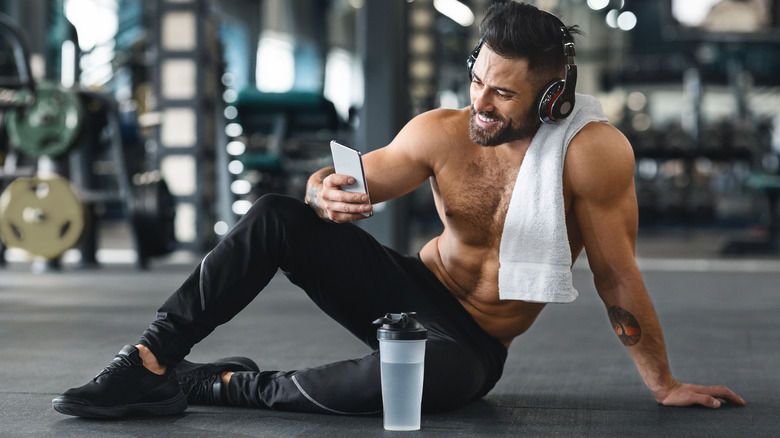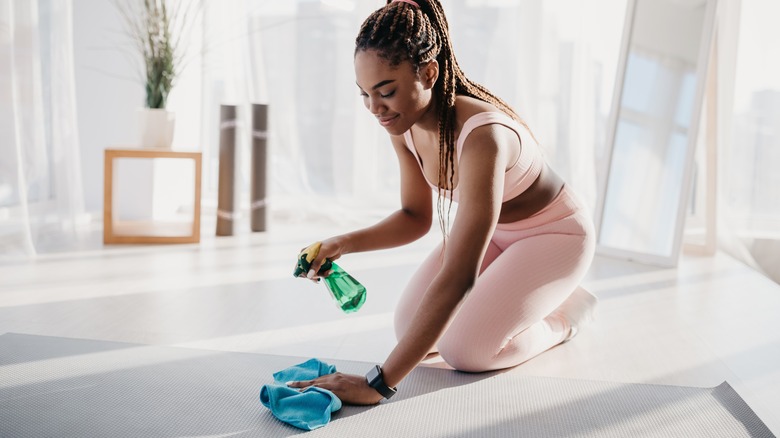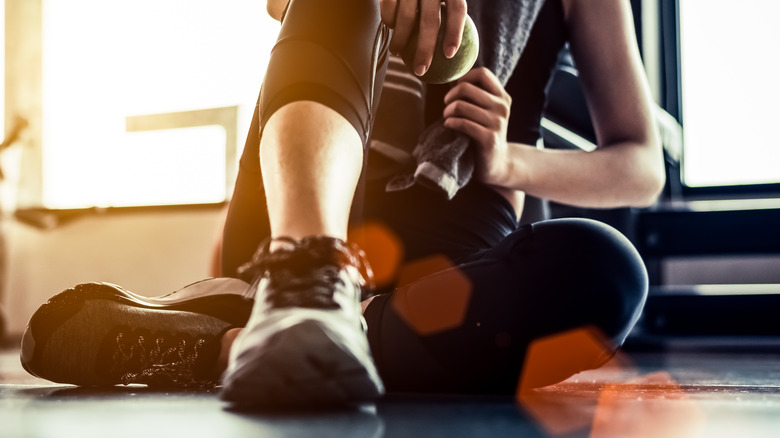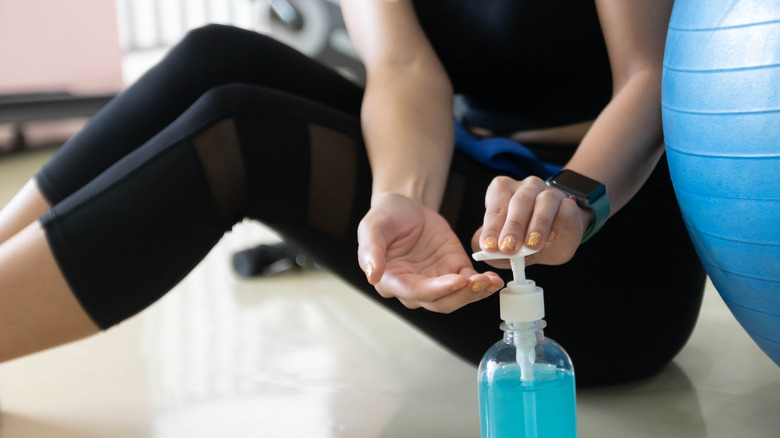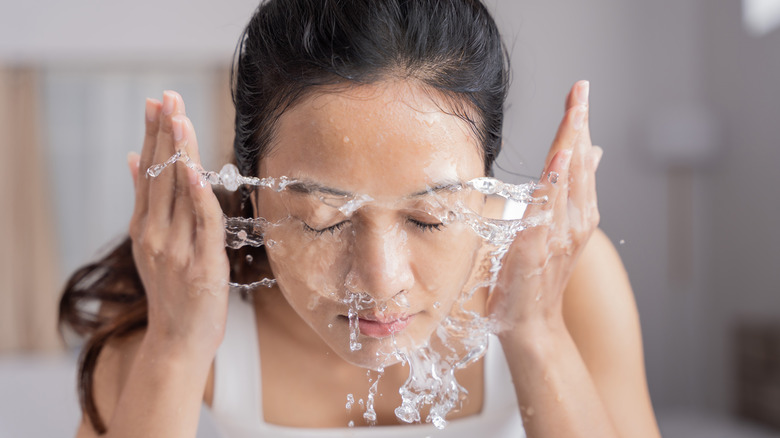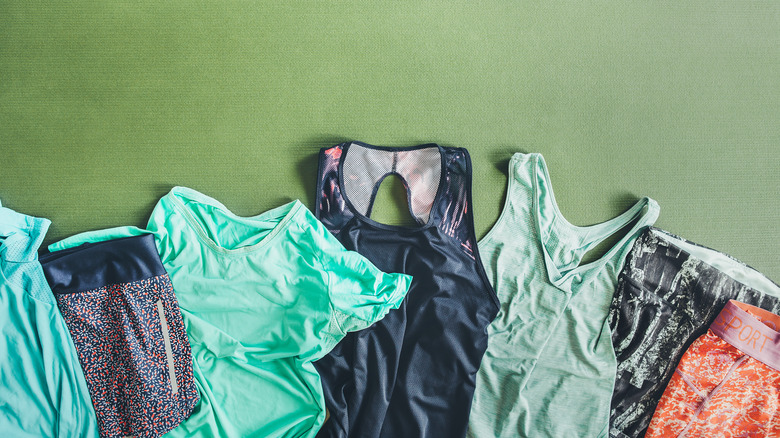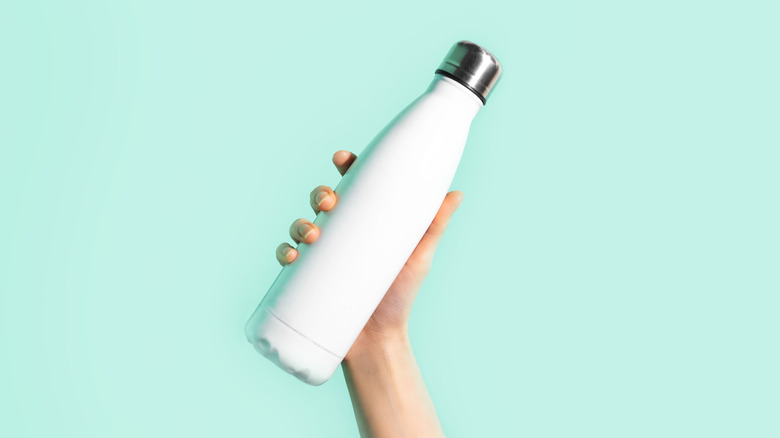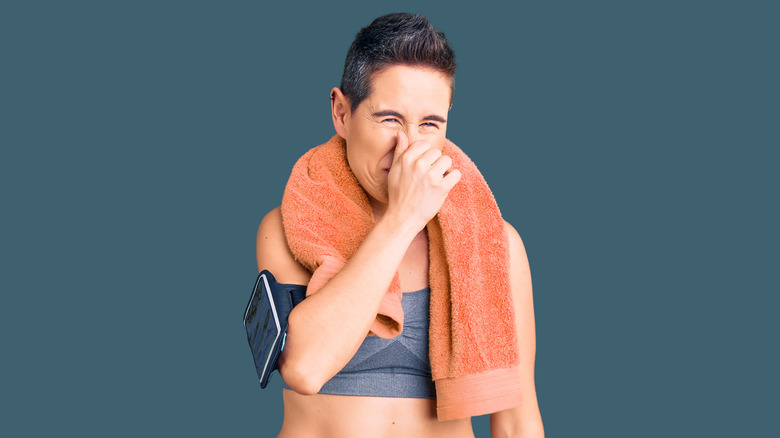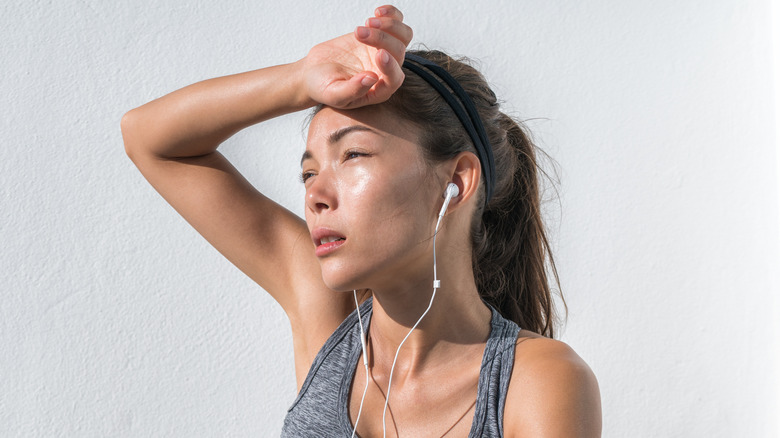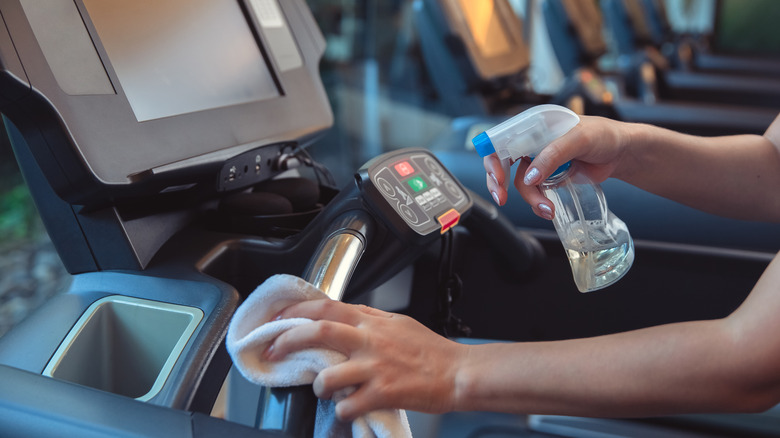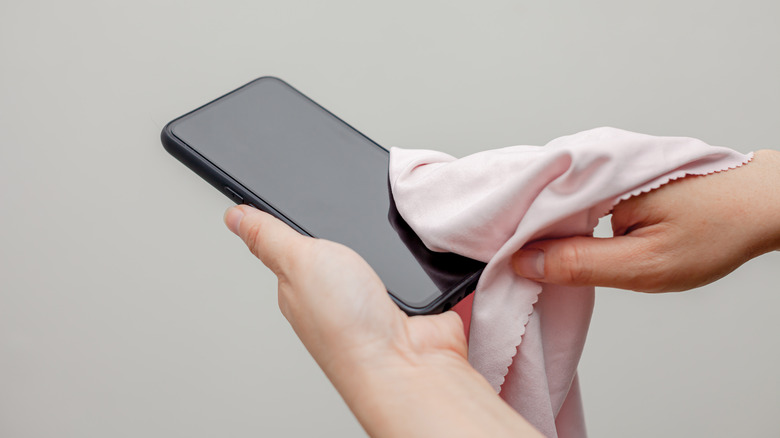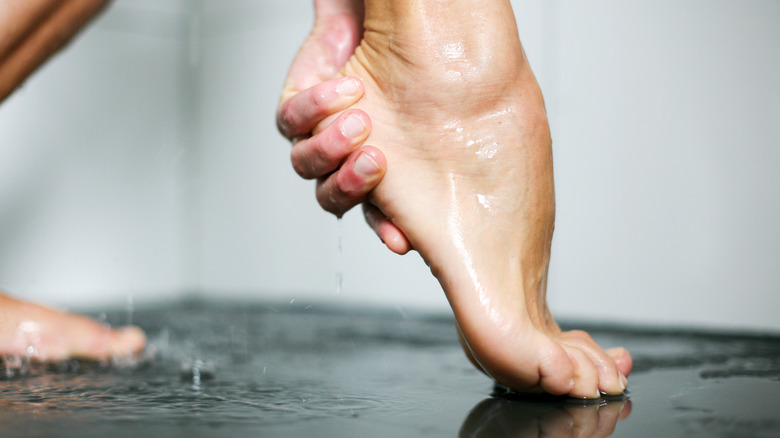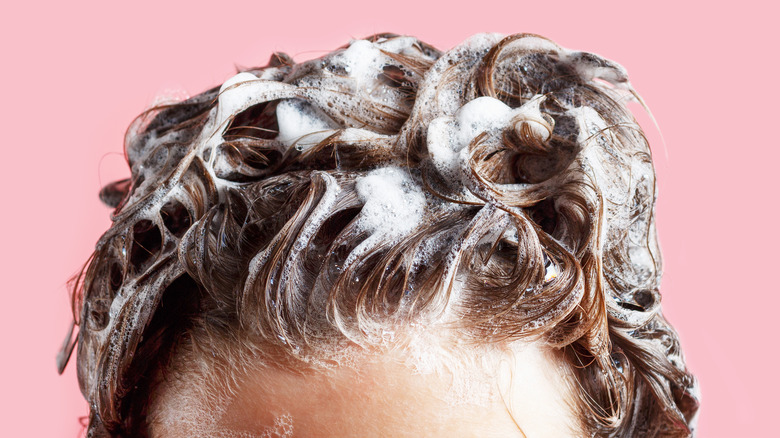Hygiene Mistakes You're Making After Your Workout
Let's face it: Working out isn't always mess-free — unless you're one of those people who can seem to run a half-marathon without breaking a sweat (and if you are, well, we need to know your secret). Chances are, a hard workout is going to leave you with a bit of a cleanup on your hands. Between wiping away sweat, changing in and out of exercise clothes, dealing with gym equipment, sharing objects with fellow exercisers, and checking your phone while you do all of these things, it's easy to see how hygiene can start to slip.
Thankfully, gyms in the United States are particularly stringent around cleanliness standards, especially these days. "Those of us who chose the fitness industry as a career believe in the health benefits of exercise and want to deliver a healthy option to our communities," fitness center owner Jason Reinhardt told the Global Health & Fitness Association. "Therefore, the health and safety of our members, staff, and community is our top priority." But sometimes, it's our own bad habits that can make things a little less than hygienic.
Not wiping down your yoga mat
After a yoga session, all anyone wants to do is bask in that serene, centered glow for as long as possible. Thus, we can understand why wiping down your yoga mat isn't exactly a top-priority job. But forgetting to do so could set you up for some hygiene setbacks further down the line.
"The yoga mat is a very fertile source for infection, mainly because people sweat on them and they rarely are cleaned," Rutgers professor of medicine Robert Lahita told HuffPost. Lahita explained that a yoga mat is essentially "a perfect incubator for many of our skin infections." Yes, various bacteria make themselves at home on your mat and can lead to acne, athlete's foot, ringworm, or even MRSA, dermatology professor Elizabeth Grice told Philadelphia Magazine.
If you're in a shared class that supplies yoga mats, don't neglect to wipe down your mat, or else you risk making a hygiene mistake that will affect more than just you. Grice actually recommends avoiding sharing yoga mats entirely due to their potential infectious qualities, but if you can't avoid doing so, clean the mat both before and after exercise. Most yoga studios have cleaning supplies available for patrons to use. If not, bring your own simple solution of dish soap and water (viaYoga Journal).
Failing to change out of your sweaty socks and sneakers
Look, we get it. After a hard workout, it can feel pretty tiresome to immediately switch out your shoes. Surely you've earned the right to just chill out, no? While we don't dispute that, chilling out for too long in the socks and sneakers that you've exercised in could be a recipe for disaster for your foot hygiene.
Staying in damp shoes and socks can increase the likelihood of development of developing athlete's foot, a fungal skin condition that can cause irritation, itching, cracked skin, and blisters, according to the Mayo Clinic. The development of athlete's foot can accelerate in warm, humid conditions, or by shoes that have limited ventilation.
To minimize the risk of athlete's foot, it's best to let your feet air out as quickly as possible after exercise and to change your socks regularly. Buying socks and shoes that are specifically designed to help sweat wick away. Socks made from materials like Merino wool, polyester, and elastane are all great choices that can help keep your feet dry during a workout, according to Verywell Health.
Not showering as soon as possible
A nice hot shower after a workout is one of life's great pleasures. But if you're heading straight from an exercise class straight to pick up the kids from school, then running to the store to get something for dinner, then taking a quick call — before you know it, hours can pass between your workout and shower. And getting clean after a workout isn't just to stay smelling fresh.
"Of course you would want to get rid of that sweaty odor to not to drive your loved ones away, but it also has its health benefits," Yuma Regional Medical Center hospitalist Ashish Sharma told Livestrong. "During intense workouts, you may develop heat rash, skin break down and risk of skin breach by bacteria, which grow rapidly on sweaty skin."
Avoiding a shower after a workout can also lead to acne breakouts, according to New York City Dermatology and Laser Group founder Arash Akhavan. This is because the natural oils and sweat in your skin combine and clog up pores. The way to help avoid all of these things, Sharma said, is by showering. And showering after a workout has more benefits than just keeping your skin healthy, too. Doing so can help your muscles recover faster, reduce post-workout soreness, and help you get back to exercise quicker (per Healthline).
Forgetting to clean your hands after a workout
When you're trying to get a full-body workout in at the gym, cleaning your hands is probably pretty low on your list of priorities. But think about it: How many things do you touch while you're there? Bouncing from the free weights to the vending machine to the water cooler means that your hands are coming into contact with a lot of things. And, as WebMD asserts, all of this touching can increase your likelihood of picking up fungal infections when you work out like jock itch, ringworm, and staph infections, among others. Cleaning your hands after working out also helps you avoid contracting other contact-based infections like COVID-19 (per Live Healthily).
The solution? You have to wash your hands, folks. Make sure you do so thoroughly before and after working out for at least 20 seconds using soap that produces a lather, rinsing, and drying well (via WebMD). If you don't have access to water and soap to wash your hands, using an alcohol-based hand sanitizer can also help you stay clean. Opt for one that has a minimum of 60% alcohol for the best results.
Skipping the face wash
That post-workout glow can leave you feeling pretty sweet, with the healthy radiance your skin gives off leaving you the envy of strangers and friends alike. But you might not want to allow that glow to linger too long, due to the potential problems it can create. "It's very important to clean skin gently following a workout to remove bacteria and sweat residue that accumulated during your workout," dermatologist Robyn Gmyrek of New York City's Union Square Laser Dermatology told HuffPost. Neglecting to do so can cause skin breakouts and clogged pores.
Washing your face also helps to "prevent breaking of blood vessels and return skin temperature to a normal level quicker," according to Gmyrek, which helps to maintain its overall health. You should be washing your face whether or not you wear makeup, although Gmyrek does recommend trying to remove makeup before exercise to let your skin breathe better.
If you don't have access to face wash after your workout — although a gentle skin cleanser followed by a light moisturizer will give you the best results — simply splashing your face quickly with some cool water is better than nothing.
Leaving on those sweaty workout clothes
Okay, so you've just finished a hard run, you're home, and you don't have to go out for a few hours. Surely, it must be okay to stay in your workout clothes for a while? On the contrary, you really should change out of your sweaty clothes as soon as possible. The main issue with marinating in sweat-covered clothes is the reaction of warm moisture with your body, according to Verywell Fit. This can lead to a host of potential health concerns. The most troubling of which is an increased risk of infection. Staying in sweaty clothes for too long can result in the development of yeast infections, urinary tract infections as well as fungal infections taking hold in your bodily crevices and bacterial infections on the outside of your skin. Yikes! That's a lot of things we don't want to happen.
And that's not all. Keeping particularly restrictive workout clothes on when they're sweaty can result in friction between the clothes and your skin, leading to everyone's least favorite thing: Chafing. At best seriously irritating, chafing can quickly turn nasty, leading to infection or heat rash, Verywell Fit says. The best way to avoid this is by drying off your skin and putting on fresh clothes as soon as possible after exercise.
Refilling your water bottle without properly cleaning it first
By now it's pretty much common knowledge that reusing water bottles has a host of benefits for the environment, as well as your wallet. But you're going to want to make sure that your reusable water bottle is being emptied and cleaned regularly, as failing to do so can lead to some pretty unfortunate health concerns. "Mold tends to grow in stagnant water, and since the bottle is never sterile, bacteria can grow, too," New Jersey-based family medicine specialist Maria Vila told Livestrong. Not only that, but you can end up directly contributing to the number of bacteria in your water bottle in the process of drinking from it when bacteria in your mouth washes back into the container, according to Vila.
The transference of bacteria from your hands to your bottle is also possible — as can also result from sharing your bottle with other people. Ideally, you should be cleaning your bottle at least once a week, and if possible, cleaning after each use will ensure your water receptacle stays like new. And if you're having trouble getting it sparkling, try a bottle brush, which "allows you to scrub all the way into the bottle to get it fully clean," according to registered dietitian Alex Lewis.
Reusing your gym towel
For those super-sweaty workouts, your towel is your greatest ally. But be sure to return the favor to them by washing them afterward. Damp towels are pretty much an amusement park for germs and other microorganisms, according to Healthline. When you wipe yourself down after exercise, your dead skin cells, and any bacteria that's been picked up on your hands or ace, combine with the moisture from your sweat into one big breeding ground.
It's for this reason that it's recommended that gym towels should be washed pretty much every time they're used, especially towels that are used and then bunched up in a gym bag. That'll help keep any bacteria or fungi from taking hold of them, which can then transfer back to you upon next use. Make sure your towel is totally dry before putting it in the hamper and, naturally, make sure it's also completely dry after laundering. Usually, a simple machine wash will be enough to get rid of any potentially harmful microorganisms present. Just make sure that you're not overloading your washing machine, so your towels have enough space to be cleaned properly.
Leaving in your damp earbuds
A workout is nothing without a good soundtrack, right? Whether your taste dictates choosing '80s power ballads (commendable) or up-to-the-minute house beats (also commendable), failing to give your earbuds the aftercare they need may cost you more than you think.
Earbuds provide a solid seal to the top of your ear canal. When moisture gets inside and builds up, bacteria get very happy. "This increase is a fertile breeding ground for bacteria, and if circumstances are right, an external infection can occur" to the ear, K Health chief diagnosis officer and board-certified emergency medicine physician Neil Brown told Tech Republic.
So if you're heading out of the gym with your earbuds damp from sweat, this will naturally increase the moisture getting into your ear canal — and the possibility of infection. If your ears are feeling particularly moist after exercise, wipe them down with a towel, and remove your earbuds to give your ears time to dry. Similarly, make sure your earbuds are dry before using.
Not cleaning gym equipment
Your favorite gym machine might give you a top-notch workout, but you want to make sure it's not giving you, or the person who uses it after you, more than that. Gym machines are prime vessels for bacteria, as objects that are touched by multiple different people in moist, warm environments, can harbor a shocking number of bacteria.
The average exercise bike in a gym can have bacteria levels that are — wait for it – 39 times higher than a reusable plastic lunch tray, according to a study conducted by Fit Rated. Free weights and treadmills didn't fare better, unfortunately. A treadmill can contain bacteria levels equivalent to over 70 times the number found on a water faucet, and your average free weight has 362 times (yes, you read that right, 362) the bacteria found on a toilet seat.
To add further incentive to clean your gym equipment, the Fit Rated study found that over 70% of the total bacteria found on these items could be possibly harmful, with the microorganisms having the potential to cause skin infections, as well as conditions like pneumonia. Cleaning the machines you use before and after your workout can help minimize the risk of picking these up.
Failing to disinfect your phone
In our haste to wash our hands and face and rid ourselves of our sweaty gym clothes, sometimes we can forget that the greatest poor-hygiene culprit present is hiding in plain sight. Our cell phones, with their screens that are prodded and swiped dozens of times a day, can end up being bacteria central. "Because people are always carrying their cell phones even in situations where they would normally wash their hands before doing anything, cell phones do tend to get pretty gross," Emily Martin, assistant professor of epidemiology at the University of Michigan School of Public Health, told Time.
In a gym setting, this can get even worse. Gym equipment like free weights, treadmills, and exercise bikes can carry bacteria levels that number in their levels much higher than other everyday objects, as a Fit Rated survey showed, and touching those and then our phones mean that we carry that bacteria out with us.
Luckily, a simple disinfectant wipe or spray (aimed directly onto a microfiber cloth) can help clean your phone safely and quickly, according to Verizon. Just make sure your phone is switched off before you clean it, and don't use a paper towel or products made of 100% alcohol, as these can damage your electronics.
Going barefoot in the shower
We've probably all heard the horror stories of people stepping barefoot in a public shower once and having all sorts of health mishaps, but is it actually that bad? Unfortunately, it may well be. Stepping into a gym shower barefoot after working out can open you up to a world of potential hygiene risks.
"If you're in a public shower anywhere, you don't have a clue who's been there, who's used it, how often it's cleaned," Marilyn Roberts, professor of environmental and occupational health sciences at the University of Washington School of Public Health, told Vice. Going barefoot in a communal environment that, with its damp and humid nature, is prime real estate for bacteria, mold, and fungi, means that your feet can easily come into contact and pick up potential infectious microorganisms.
The fungi that cause jock itch and Athlete's foot, dermatophytes, are particularly common in shower and locker-room environments, according to Healthline. Viruses can also thrive on shower floors in gyms and end up causing some nasty consequences, such as the HPV virus, which can result in warts. The solution? A simple pair of flip-flops can help create a barrier between your feet and the floor, or else simply wait until you get home to shower.
Skipping the shampoo
After a big ole workout, you're going to want to get yourself feeling fresh. Just make sure that extends to the top of your head as well. Washing your hair after a workout is advised for several reasons, with the first being to keep dandruff at bay. Dandruff, which can be a manifestation of fungal production, is pretty common and something that "we all have to a certain degree, but buildup from sweat and oil creates a perfect breeding ground, and the fungus over-colonizes," board-certified dermatologist Sapna Palep told Livestrong. This causes the flakiness associated with dandruff that we all know well. Untreated dandruff also has increased potential to work its way under your skin's superficial layers, causing irritation and potential hair loss.
Depending on how much you sweat during a workout, it may be helpful to wash your hair — focusing on your scalp in particular — after each exercise session. If you sweat less, however, you may not need to after every workout. And if your hair is naturally kinky or curly, you should only wash it once a week regardless of sweat to preserve its oils, Dr. Crystal Aguh, Johns Hopkins School of Medicine assistant professor of dermatology, advised to Livestrong.

